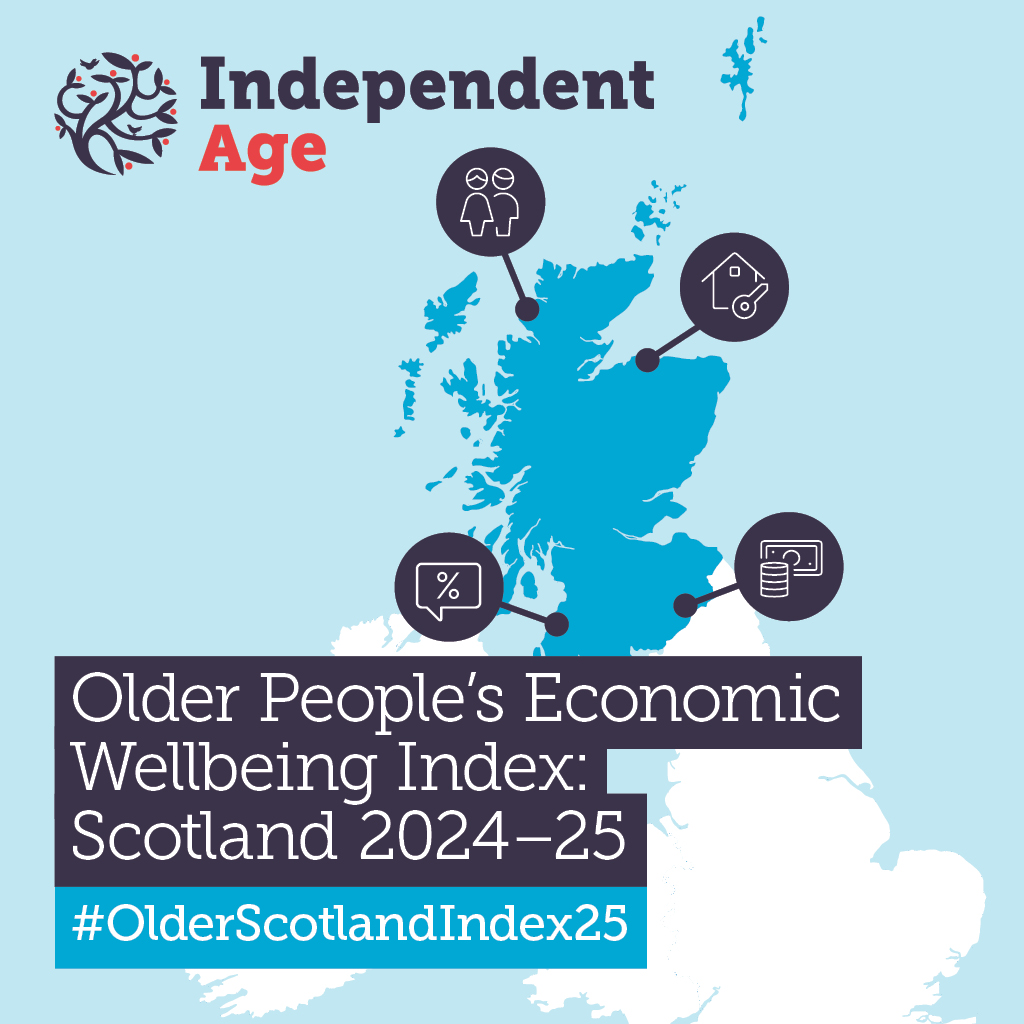
Louise Brady,Scotland Policy and Public Affairs Officer, Independent Age
With the recently introduced means-testing of Winter Fuel Payment and the debates which followed in Scotland around the newly devolved Pension Age Winter Heating Payment, there’s been an increased focus politically and in the media on the difficulties some older people are facing to make ends meet. While winter is coming to an end, 156,122 pensioners in Scotland still live in relative poverty (with 80,900 of those in severe poverty) and the financial pressures they face go far beyond the struggle of keeping their homes warm.
In order to more fully understand how older people experience and respond to those financial pressures, and to help map out the actions needed to tackle poverty and its impacts, Independent Age have today launched our inaugural Older People’s Wellbeing Index: Scotland 2024-25.
Using nationally representative polling of people aged 66 and over which was conducted by the Diffley Partnership, the Index demonstrates the scale of the income, costs and housing pressures faced by older people living on a low income across Scotland – from cutting back on heating, food and social contact, to feeling unheard when decisions are made that shape their lives. The research, which will be repeated annually, tracks trends across poverty in later life and highlights the experiences of a range of groups who are more likely to be in poverty, including people with caring responsibilities, women and people living with a disability.
Almost one in five (19%) pensioners in Scotland reported having an annual household income of less than £15,000, with this rate rising to one quarter (24%) of women.
When it comes to awareness of the support available, shockingly one fifth (21%) of those with a household income of less than £15,000 aren’t aware of Pension Credit, a payment which can boost incomes and passport to other entitlements. One quarter (24%) of older people who have a health condition or a disability aren’t aware of disability-related payments. This trend continues through to Housing Benefit, with 1 in 6 (16%) older private renters not aware of this despite serious issues of affordability in the private rented sector.
The poll also asked pensioners about the actions they’ve taken to cope, finding that half (50%) have cut back on heating and utilities, rising to 83% of those who live on a household income of less than £15,000. Other actions include reducing food quality (25%), reducing social interactions (35%), and taking money out of savings or pensions to cover essential costs (35%). Worryingly, almost one third (32%) of older people who have a health condition have skipped meals because of food costs.
The Index identifies many other issues that older people face, from feeling politically unrepresented, to dissatisfaction with the social security system, and living in homes which aren’t suitable for their needs.
It’s well known that poverty comes at a cost, not only for those experiencing it but for the public purse which deals with its fall out, especially in health and social care budgets.
With predicted increases in the proportion of those over State Pension age, without urgent action, the current poverty rate will see the number of older people in poverty rise to around 190,000 by 2040. This must serve to focus minds on developing and delivering upstream policy interventions.
At Independent Age, we hear from older people every day, like Arthur from Glasgow who told us:
Every day is a struggle. I go to bed with my coat and thermal socks on and I’m still cold. I looked in my fridge this morning and it’s empty. All I’ve got left in there is some milk.
We urge all political parties to address pensioner poverty as a key priority. Action is required across a whole range of policy areas including ensuring people’s homes are suitable and affordable, helping people access all the financial support they are entitled to (100% take up in Pension Credit for example could cut pensioner poverty rates by around a third), and ensuring social security pensioner payments are set at an adequate rate.
We are calling on the Scottish Parliament, Government and all political parties to develop and implement an action-oriented and comprehensive Pensioner Poverty Strategy for Scotland. As shown in the Index, that’s a policy recommendation supported by 85% of older people.
Older people need to see action now so that next year’s edition of the Older People’s Economic Wellbeing Index shows improvements across all areas and a reduction in pensioner poverty in Scotland moving forward.


Enter your email address to receive regular e-updates about our work. If at any time you want to stop receiving these, simply contact us. We’ll keep your details safe and won’t share them with any other organisations for their marketing purposes. For full details see our Privacy Policy.